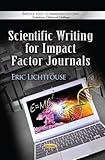Scientific writing for impact factor journals Eric Lichtfouse
Tipo de material: Libro
impreso(a)
Idioma: Inglés Series Detalles de publicación: New York Nova Science Publishers c2013Descripción: xii, 87 páginas fotografías 23 centímetrosISBN:
Libro
impreso(a)
Idioma: Inglés Series Detalles de publicación: New York Nova Science Publishers c2013Descripción: xii, 87 páginas fotografías 23 centímetrosISBN: - 1626189439
- 9781626189430
- F/808.0665 L5
Incluye bibliografía: páginas 81-82 e índice: páginas 83-87
Foreword.. Preface.. Acknowledgments.. Chapter 1 General Advice.. Chapter 2 Tips By Section.. Appendices.. Index
Publish or Perish. This old adage illustrates the importance of scientific communication; essential to research, it also represents a strategic sector for each countrys competitiveness. An often-neglected topic, scientific communication is of vital importance, with new information technologies accelerating and profoundly changing how knowledge is disseminated. The necessity of optimally disseminating experts findings has also become crucial to researchers, institutes and universities alike, which has prompted the recent advent of Impact Factors for the evaluation and financing of research, the goal being for scientific knowledge to be equally distributed to a very broad audience, especially to the media, entrepreneurs and socio-political players. This handbook presents the golden rules for publishing scientific articles. In order to do away with major recurring errors, the author explains how to easily structure an article and offers support for the typical mistakes made by native French speakers publishing in English, tips on how to make the style more academic of more general to fit your intended readership and, in the books closing section, suggests new publishing techniques of the Internet age such as the micro-article, which allows researchers to focus their findings into a single innovative point. The major principles presented can be applied to a broad range of documents such as theses, industry reports, publicity texts, letters of intent, CVs/resumes, blogs and press releases, as all of these documents involve presenting information on advances, discoveries, innovations, or changes to our previous knowledge. Inglés


